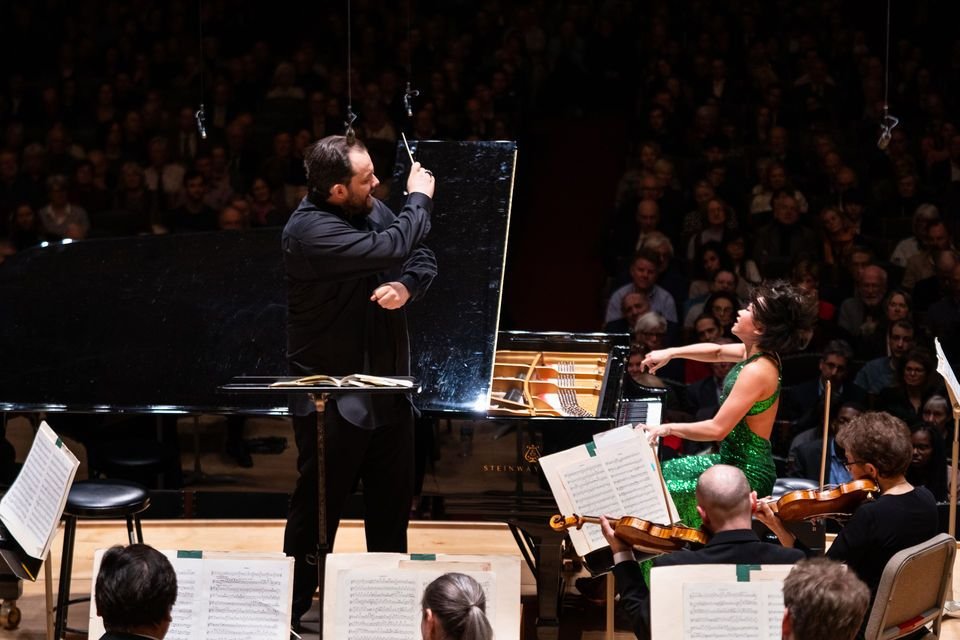Schumann and Bruckner: Romanticism and Farewell with Wang, Nelsons, and BSO

Photo Courtesy of Robert Torres
Saturday nights at the Boston Symphony Orchestra are almost always full. Unlike the Thursday evening performance or the Friday matinee, on Saturdays, the BSO is performing music that they have refined over the past week through both practice and performance. Yuja Wang and Andris Nelsons, along with the musicians of the BSO, made the most of the energy that radiated from the seats in Symphony Hall.
The first notes of the Schumann rang strongly: the biting enunciation of the first theme in the piano was hammered out by Wang with an alacrity that defied the standard yet retained repose and form. That same strength was heard in the first shining moment for the winds: their initial rendition of the Chiara theme, which Schumann wrote to spell out the Italian version of his wife’s name Clara, was velvety and full. Oboist John Ferrillo, in particular, infused his playing with a particular timbre of elegance which not only lent warmth and romanticism to this concerto’s dedication to Clara but also helped round out this orchestra’s relatively small woodwind section.
The audience was spellbound for the cadenza that concluded the lengthy first movement, with Wang bringing her familiar diction and passion to each rising and falling harmonic showcase, while still maintaining a limber sense of fluid grace in the mellifluous recollections of the theme. As in the opening movement, the orchestra was confident in the Intermezzo, thanks especially to Nelsons’s close attention to the winds. The third and final movement, heading toward a redoubled close, was buttressed by a clean and crisp cohesion between the BSO and the star pianist, and the horn solos were notably pronounced and perfectly situated in the landscape of this Allegro Vivace.
The hall emptied out a bit after the first half, with many younger listeners opting to sit out the Bruckner, but nevertheless, the magic of the orchestra in Bruckner’s unfinished 9th was palpable and absolutely enchanting. The first theme, ushered in by a chorale in the brass section, weaved a lush deep purple tapestry of rich sound. In the splendor of the BSO’s rendition, it was difficult to hear the anxiety and pensiveness with which the composer was fraught in his final years.
The symphony is nearly Mahlerian in its diversity of tonality and atonality alike, and the flowing transitions which follow from monophonic monumental moments recall the declarative hallmarks of Mahler’s 7th. As the rocking Scherzo blistered through Symphony Hall, the audience was reminded that Bruckner was more than the ‘out of fashion Wagnerian’ from Vienna that history sometimes paints him to be. Although the symphony was long, it still missed its fourth and final movement, which no doubt would have rendered the symphony a more cohesive, longer, completed whole. Nevertheless, Nelsons was able to capably guide the BSO through the meaningful portents and lamentations of the third movement’s Adagio, fitting for Bruckner’s own address of the movement as a “farewell to life.”
Overall, the concert was one of the best of the season so far: from the romanticism of Schumann’s Piano Concerto in a minor, performed by the world-renowned and always energetic Yuja Wang to Nelson’s own treatment of the deep and emotional 9th Symphony of Bruckner, the colors and talents of the BSO were on full display.
Topher Colby is a producer for WHRB Classical. You’ll be able to hear his feature on The Dorian Mode on Wednesdays at 6pm beginning March 6th. You can see the entire program guide here: /programming/program-guide